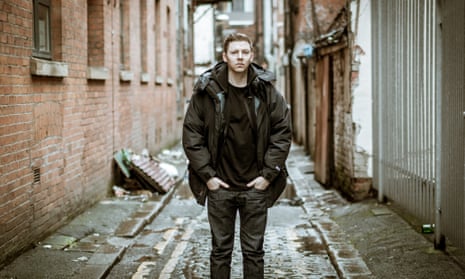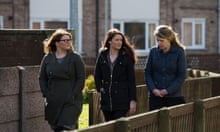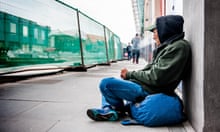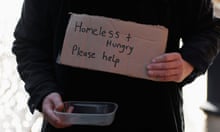When the rapper Professor Green set out to explore contemporary experiences of homelessness among young people for a BBC3 documentary, airing on Tuesday 9 February,, he came to see me as I had spent a year conducting ethnographic research with young homeless people in London.
Youth homelessness is already a problem in the UK and the safety net is being further eroded through proposed changes to housing benefits. The consequences could be disastrous.
It is difficult to calculate the exact number of young homeless people in the UK. In 2015, the Cambridge Centre for Housing and Research found that 83,000 young people had been accommodated by local authorities or homelessness services in the previous year and in 2014, Crisis found that 8% of 16- to 24-year-olds said they had been homeless in the previous five years. Street homelessness is also on the rise, up 40% in London since 2011.
Yet youth homelessness is not limited to the young people who are visible on the streets – others are “sofa-surfing” or living in temporary hostels – or to those who approach their council for assistance.
As Professor Green, real name Stephen Manderson, says in the documentary: “Homelessness isn’t just about not having a home. Once people have been on the streets, what it does to them psychologically, who they become and how they become accustomed to living their life doesn’t just go away once they get a home. Being in a hostel, you’re not counted as being homeless, but you are still very much homeless, that’s become quickly apparent.”
Access to emergency accommodation has also become more difficult in places where homelessness is most acute. New Horizon Youth Centre made the headlines for providing young homeless people in London with bus tickets for the night in cases when emergency hostel accommodation was unavailable. This is in part because of the extension of the “local connection” policy to hostels, which means that the money for beds is ringfenced for those who can prove a connection to the local authority, and also because young people are increasingly priced out of the private rental market in the capital.
When trying to assist young homeless people, charities are in a double bind. They must provide emergency short-term solutions (bus tickets, food parcels) but their funding often requires measurable outcomes, such as the progress of an individual into education or employment – difficult when that individual is sleeping on the night bus.
The scrapping of housing benefit for 18- to 21-year-olds is likely to have devastating consequences. We can expect to see even more young homeless people on the street and charities under more pressure to clothe and feed them. There will also be less visible consequences. Young people in violent domestic situations may be less inclined to seek help to leave, while others will be forced to stay in overcrowded conditions.
It is extremely difficult for a young person to gain and sustain employment or to access education without a stable base. During my research, I became used to hearing hopes and dreams put on hold for “when my housing’s sorted”. To keep someone in a state of homelessness without the means to pay for accommodation is to keep them from accessing a future.
The housing bill that will further institutionalise private ownership as a solution will do little to help young homeless people. Meanwhile, extending the right to buy to housing associations will further erode the social housing stock, and the switch to five-year tenancies for social tenants will create further housing instability.
These changes are happening in a context where the rate of youth unemployment is three times that of overall employment and young people are disproportionately affected by benefit sanctions. The impact of benefit stoppages can be devastating. In my own research, a youth worker recalled an example where a homeless young man was walking eight miles a day in each direction, just to be able to get a free lunch from a central London day centre. Beth Watts, in research for the Joseph Rowntree Foundation, found that under-25s face a substantially higher risk of being sanctioned than older adults, with 8% of this age group now affected per month.
Research from Homeless Link found that while 3% of those claiming jobseeker’s allowance were sanctioned, this rose to almost a third among homeless people. When taken together, these statistics paint a grim picture of the pressures on young homeless people.
We are on the brink of a homelessness crisis and young people are going to bear the brunt.
Professor Green: Hidden and Homeless airs on BBC3 on 9 February at 9pm and will be available on the BBC iPlayer









